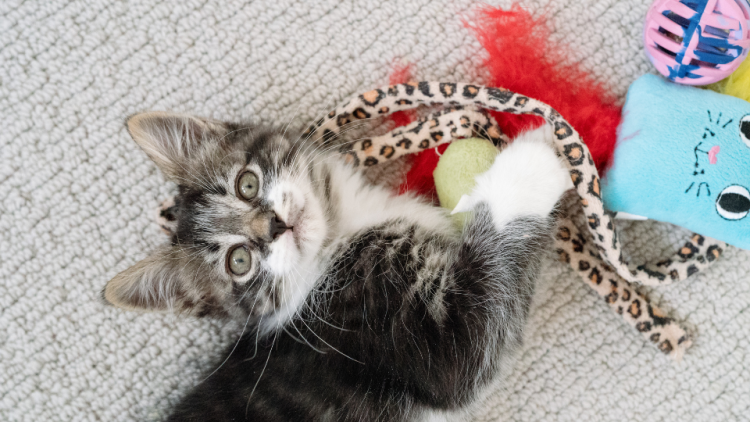It’s all too easy to get swept up in the excitement of bringing a new kitten home, but many pet parents find themselves surprised by their feline family member's behavior as they adjust to the different environment. When it comes to raising kittens, correcting bad habits early on is crucial, yet many first-time kitten owners are unsure of what steps to take.
Protect Your Kitten with Cat Insurance Get the New Kitten Checklist
As someone who has spent a lot of time fostering and adopting kittens, I've learned some valuable lessons over the years. There are a few things to know before getting a cat that can help you avoid the challenges that many first-time kitten owners face.
Here are seven must-know tips for raising a kitten that will help your feline friend transition into your home with ease:
- Long trraining sessions can do more harm than good
- Don't surpress your kitten's natural instincts
- Respect your kitten's litter box preferences
- Patience is key to the best results
- Learn what foods your kitten can and can't eat
- Give your kitten plenty of playtime
- Vet bills can cost thousands of dollars
- Key Takeaways
Long Training Sessions Can Do More Harm Than Good
Many of us think more of a good thing can only create better results. However, training your kitten for extended chunks of time can actually hinder their progress and result in stress-induced negative behaviors, like excessive scratching or urinating outside the litter box.
Kittens are like young children. You wouldn’t expect a toddler to practice something for hours. Don’t expect the same of your kitten.
I recommend spending one to five minutes a day, several times a day, for the best training results1. Ideally, try incorporating these short training sessions into your kitten’s regular routine, like before meals or bed.
Don’t Suppress Your Kitten’s Natural Instincts
All kittens have innate instincts that inspire them to explore their surroundings by jumping, clawing, chewing, scratching, and climbing things around them.
While this may be frustrating, it’s essential to recognize that your kitten is a cat, and these instincts are normal and natural.

Instead of punishing your kitten for them, work on encouraging them to jump, claw, scratch, or chew approved items, such as a cat tree, perch, or toy. Provide your kitten with boxes or laundry bins to hide in and allow them to explore their world.
Respect Your Kitten’s Litter Box Preferences
Many pet parents are surprised to learn that kittens can be extremely fussy about their litter boxes.
If the litter box isn’t in the right spot, is too big or small, or has the wrong type of litter, you’ll likely struggle with training your kitten to use it regularly.
So, how can you learn your kitten’s litter box preferences?
Here are a few suggestions to follow when choosing and setting up your kitten’s litter box:3
- Choose an unscented, fine litter that clumps together
- Place the litter box in a low-traffic, quiet area of your home
- Pick an uncovered box if possible
- Choose a litter box with enough room for your kitten to turn around without touching the sides of the box and enough space to push their eliminations to one area where they won’t touch it upon reentering the box.
Patience is Key to the Best Results
Many kittens experience significant stress when going home for the first time. Between all the new people and the entirely different environment, it’s not unheard of for kittens to confine themselves to one “safe area” of your home — which could be under the bed, behind a dresser, or somewhere else difficult to reach.
My advice for this is to be patient. Don’t expect your kitten to feel completely comfortable in your home within the first days or even weeks. Let them come to you, but take preventive measures to kitten-proof your house so they can't get stuck in a dangerous space.
Socialize your kitten gradually and give them love in their safe space. Make sure their litter box, food, and water are within their safe area and gradually edge these items away to expand their safe place little by little.
Kitten Socialization Checklist
The same goes for training. You’ll need to set realistic expectations for your kitten. Otherwise, you’ll both end up frustrated2. Your kitten won’t automatically know they shouldn’t claw your couch or jump on the kitchen counter. However, consistent, positive training will eventually help them learn the house rules and your expectations for them.
Learn What Foods Your Kitten Can and Can’t Eat
I used to believe that kittens and cats can drink milk without a problem. However, I learned the hard way that milk and many other human foods can harm their health.
It's vital that you educate yourself on the human foods you should never feed your kitten to keep them safe and healthy. I also recommend learning about human foods that can be delicious and nutritious treats for your kitten.
Pro Tip: Reference our comprehensive list of human foods cats can and can’t eat to learn more about the foods you should avoid feeding your kitten.
Give Your Kitten Plenty of Playtime
Kittens need plenty of time to play, explore, and burn off some of that crazy energy. Without adequate activity, your kitten may resort to destructive behaviors, like clawing and scratching at furniture, to stimulate themselves and release energy or frustration.

I recommend playing with your kitten for 10 minutes twice daily to avoid this and keep your kitten happier and healthier. Toys that play on their natural hunting instincts, such as rodent or wand toys, are excellent choices. You can even plan playtime right before a training session to burn off some of your kitten’s extra energy so they are more focused during the training session.
Essential Kitten Supply Checklist
Vet Bills Can Cost Thousands of Dollars
Your kitten may be young and healthy now, but life is unpredictable. Even young, healthy kittens can develop health problems, such as urinary blockages, that can cost thousands of dollars to treat. In many cases, these issues turn into often recurring health problems that need to be treated yearly.
Kittens are also highly accident-prone and curious, which can result in them swallowing foreign objects, like hair ties, or falling from a high surface and breaking a bone.
Cat insurance can reimburse you for up to 100% of out-of-pocket vet bills for accidents, illnesses, and even wellness costs, that your kitten may incur. It’s crucial to sign your kitten up now, before they develop health problems or have an accident, to get financial help for future treatments, because anything that happens prior to policy enrollment will be considered a "pre-existing condition" and excluded from coverage.
Invest in your kitten’s future today by setting up a financial safety net with a pet insurance plan.
Protect Your Kitten with Cat Insurance Get the New Kitten Checklist
Key Takeaways
- Kittens need plenty of love, patience, and time to adapt to their new surroundings.
- Set realistic expectations. Your kitten won’t automatically know what is and isn’t allowed in your home. Patiently train them and show them which behaviors are acceptable in your home.
- Pet insurance gives you a financial safety net if your kitten has an accident or develops an illness. Sign up now while your kitten is healthy so that later conditions or accidents are covered under your policy.
References
- VetStreet, “5 Cat Training Mistakes, Guilty of Any?” Accessed May 10, 2022.
- Countryside Veterinary Services, “5 Cat Training Mistakes to Avoid,” Accessed May 10, 2022.
- Veterinary Centers of America, “Housetraining for Kittens and Cats,” Accessed May 10, 2022.
